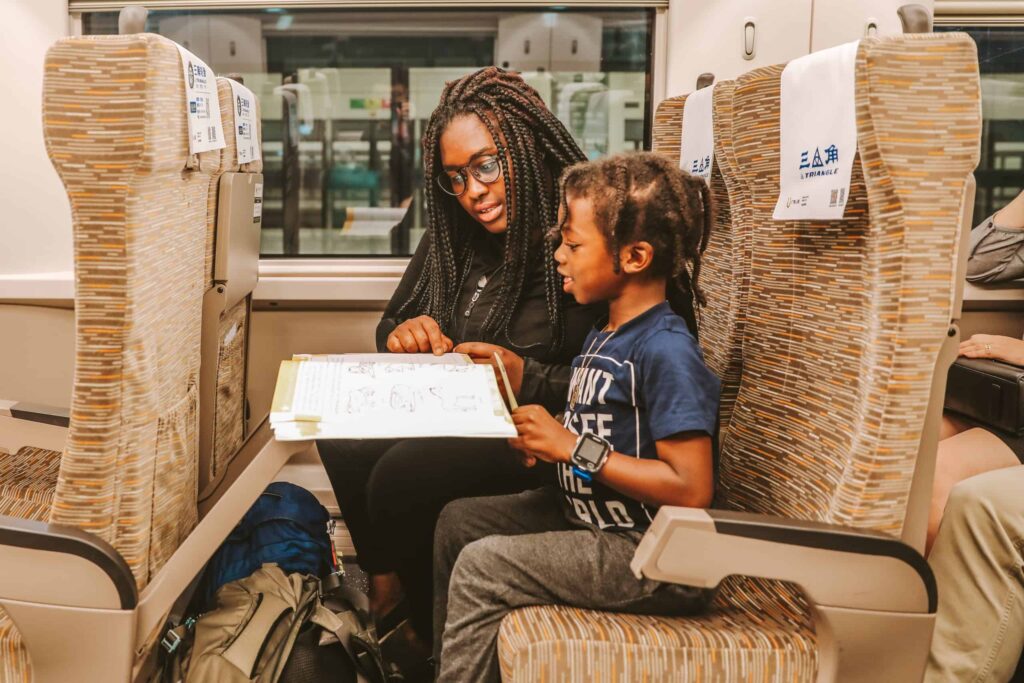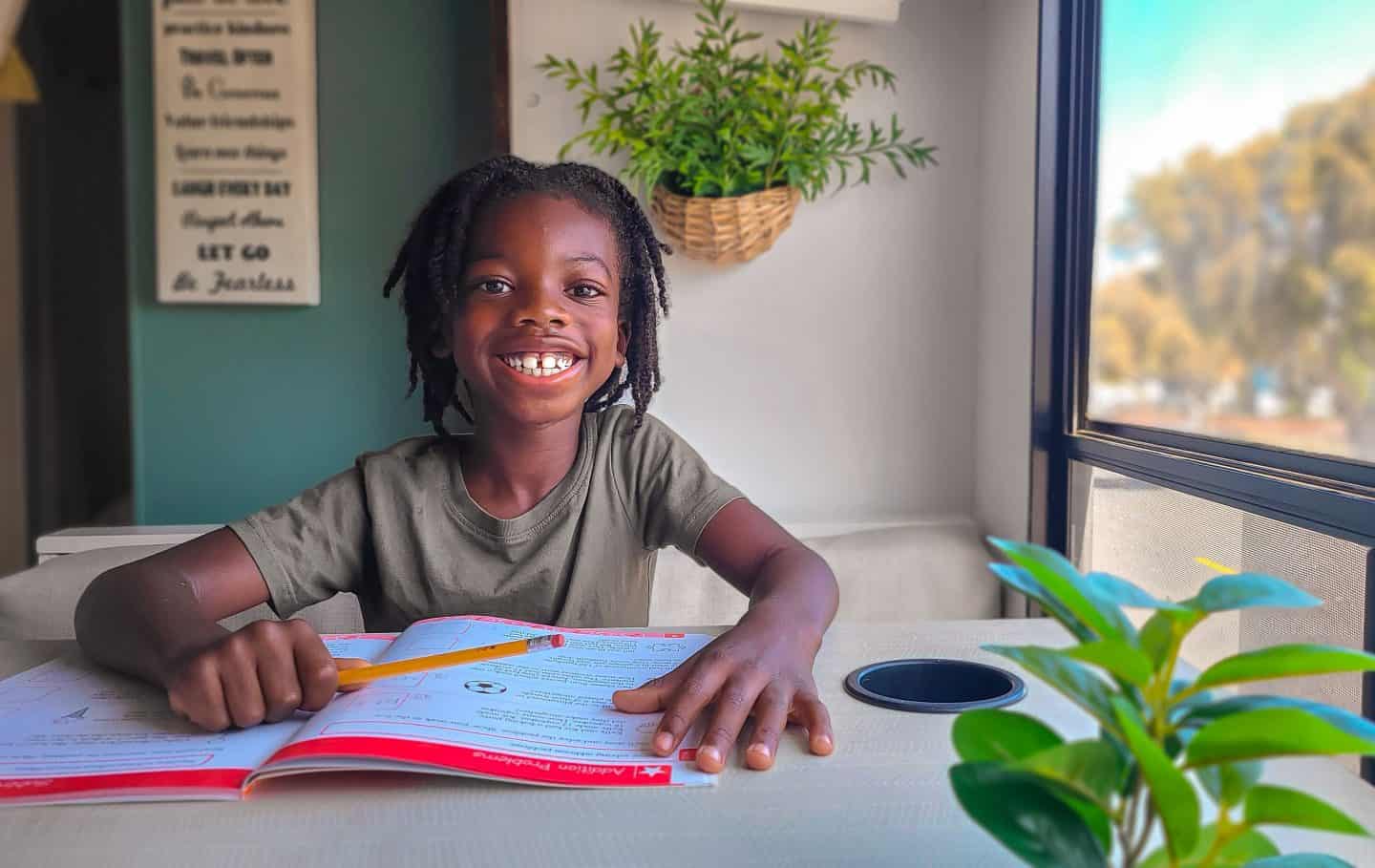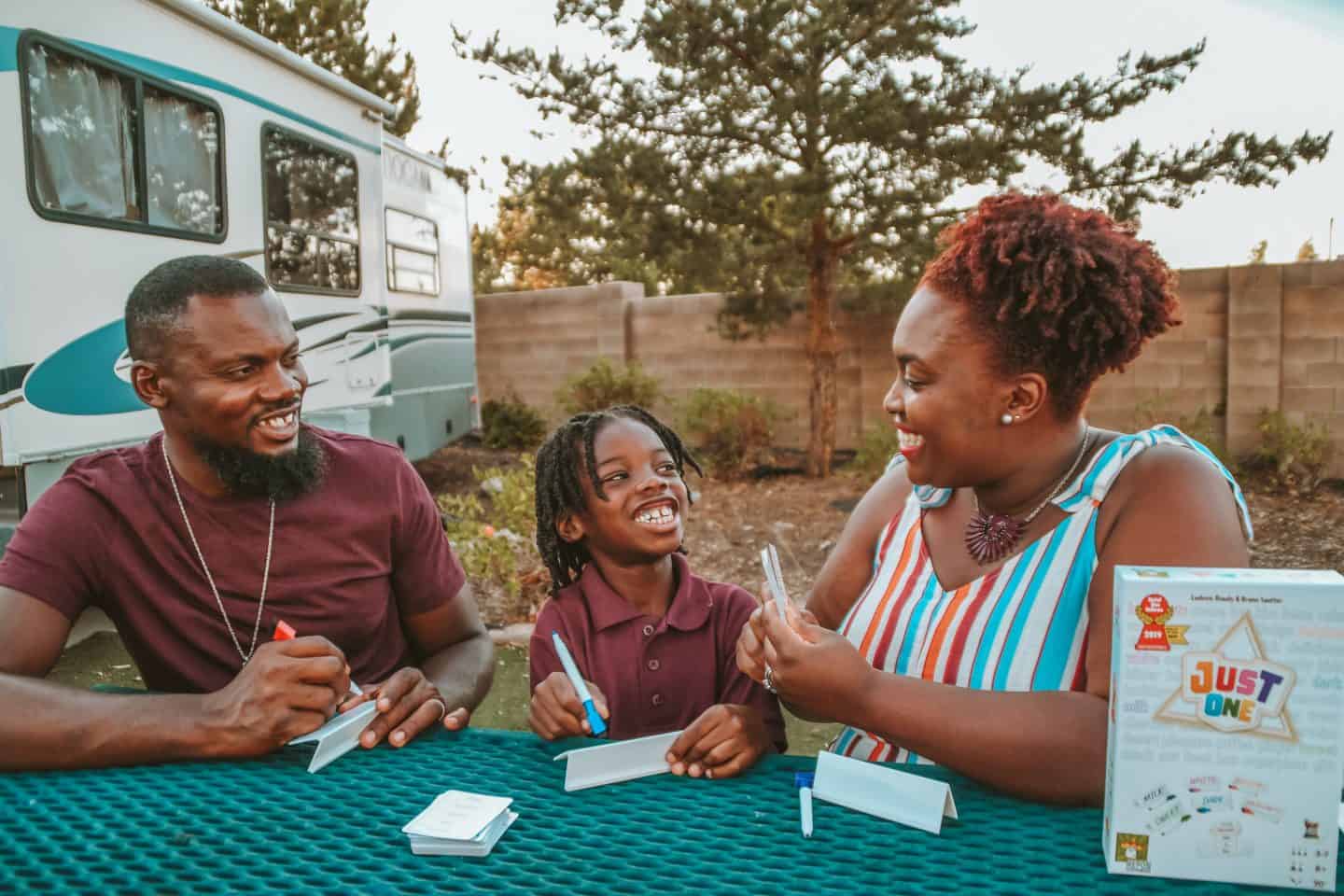
This post may contain affiliate links. By clicking on any of the links below, I may get a commission if you make a purchase at absolutely no additional charge to you. This helps offset the costs of running this blog & I appreciate your support. Please see my privacy & disclosure policy for more.
Table of Contents
When we made a decision to sell our home and live in our RV full time, we knew we were also making the decision to start homeschooling Aiden. This is a big decision for any parent and when you are considering it or reading about it, it’s always about “them.” “their kids,” “their family,” but this is about me, mine.
I was definitely overwhelmed when I was trying to figure out what is the best homeschooling, it was like foraging into a new frontier. With the onset of the pandemic, homeschooling has become even more widespread and there are many, many resources available.
I definitely view homeschooling with that a sense of parental empowerment, as a mother who is giving my son a worldwide education. I can tell you I wouldn’t change my decision for all the sand in the Sahara!

What is homeschooling?
Homeschooling is a progressive movement that has taken off in the United States and around the world in the past couple of decades with a significant increase this past year, 2020. With the Covid -19 pandemic, more parents and families are choosing to educate their children at home instead of sending them to a traditional public, private, or religious school.
Be Prepared To Defend Your Decision to Homeschool your Child
If there were to be a silver lining to the new age we are living in post 2020, from an educational standpoint, it would be that more people than ever are homeschooling their children in this country .
Although there are a vast number of families utilizing distance learning right now, many families were initially faced with the decision of choosing Distance Learning vs. Homeschooling and therefore have a better understanding of what homeschooling entails.
There are still many people, including family and friends, who don’t have this knowledge and cannot grasp the idea that homeschooled children can actually have a solid education or satisfying life without attending a traditional school.
In spite of how popular homeschooling has become, there are still many misconceptions and untruths floating around due to a lack of knowledge regarding homeschooling.
Common Misconceptions of Homeschooling

When you are first trying to prepare and figure out how to start homeschooling, you’re likely to get some backlash from the people around you. When you decided to make it “public” that you’ve switched to a homeschool curriculum you will definitely get many unwelcome, judgemental comments from friends, relatives, co-workers, and even people on the street who ask why your kids aren’t in school. (Yes, this happens!)
There are many misconceptions and untruths you may be faced with when you are preparing to start homeschooling. Although the questions are usually well-intentioned it’s helpful to have an idea of what you might hear so that you may calmly respond to this misinformation.
Here are a few tried, true, and routine untruths:
- Parent’s are not qualified to teach
- Children are stuck in the house all day.
- Homeschooled children don’t have friends/undersocialized
- Homeschooled Children can’t get into college
You aren’t qualified to teach: False!
First consider this, you’ve been teaching your child since the day they were born! There are currently no state laws that require homeschool teachers to be certified; while some states may require a high school diploma or a GED to teach children at home, some states do not. A great resource where you can check individual state laws is at HSLDA.
There are many homeschooling curricula offering a wide range of resources that contain lesson plans, teacher’s manuals, tests and answer keys all designed to give parents the tools needed to give their kids a quality education.
Children are stuck in the house all day: False!
Homeschoolers are exposed to so many opportunities beyond the school room as demonstrated by my work here. In fact, exploring the world, your own country, or even the city you live in leads to amazingly memorable and educational occasions.
With many museums, parks, science centers, live performances and community events taking place during the week at reduced prices, your children could spend less time sitting than children in a traditional school. Exploring in your own yard, planting a garden, creating a water feature, even outdoor play and projects are all part of learning.
Homeschooled children don’t have friends/under socialized. False!
There are coordinated homeschool groups for activities, field trips, classes, youth groups, arts and sports! These activities along with special projects allow them opportunities to meet and talk to a wide variety of different people. (PS–It’s been said many times, “if you’re living, you’re socializing”) True!

Homeschooled Children can’t get into college. False!
Colleges are actively recruiting homeschoolers as data routinely suggest that homeschooled students not only consistently perform better on standardized testing, but they are generally more self-disciplined, more mature, and better equipped academically than those of traditional schooling disciplines. Newer reports are noting that the skills learned from homeschooling, including time management, lead to a smoother transition to college life for homeschooled students.
How to Start Homeschooling Your Child Today:
(Steps can vary depending on where you live and laws governing your educational choices)
What are your State Homeschooling Laws?
While it may sound scary, probably one of the easiest parts of the whole process is to start with finding out what your state homeschooling laws are and their requirements.
Our nation’s largest homeschool advocacy organization is (HSLDA), Home School Legal Defense Association. They are an excellent resource and have a great page devoted to homeschool laws by state. You can check your local laws by vising their website at: https://hslda.org/legal
By selecting your state, they provide detailed information on homeschooling requirements, how to withdraw from public school, mandatory subjects and testing, as well as other resources.
Withdrawal from Public School
Withdrawing from your child’s school is an important step that cannot be ignored, especially when deciding to homeschool midyear. Additionally, each state has their own regulations in place so a written/formal notification may or not be required when setting up your homeschool. If you happen to live in a state that does call for notification to withdraw, make sure your follow through in the manner required or your child could be considered truant or a dropout.
Your Why For Wanting to Homeschool your Child

For those of you who have followed this website know how wholeheartedly I believe in homeschooling. I know my “why” and feel passionate about the global education I am providing for my son.
There is an interesting and inspired idea that might be of benefit to those of you just starting to figure out how to start homeschooling today – start by writing down your why and then figure out your how.
If you’re the type of person that the idea of writing your “why” statement appeals to you, you may find other inspiration in the process. On the other hand, If you happen to be one of those people who almost groan aloud at the thought of having to put pen to paper (or tap on those keyboards) then let’s just move on to the how…
A game plan, an outline, a visualization board, a checklist, research, whatever works for you, ask yourself how you see yourself accomplishing this new goal for your family.
Finding a Homeschool Curriculum
It can be easy for any parent starting to homeschool to feel overwhelmed since there are many homeschool curriculums out there. You should feel empowered to know you will eventually find a curriculum that fits your family lifestyle and beliefs.
It’s not a one size fits all and may take a little trial and error, but that’s another silver lining when you are trying to determine what is the best homeschool program, the ability to change and adapt your curriculum to your child. For the Akpan family, it is such an important component to know that we have the flexibility to educate our son in the way that we choose. Our choice of curriculum allows me to emphasize black excellence and expose him to African American books and literature that would not have been emphasized in the traditional school system.
If you are interested in looking at the vision of what homeschooling for black families could encompass, take a look at an article on this site posted in October of 2018, A Comprehensive Resource Guide For Black Homeschooling Families. It is just as relevant today as it was two years ago in demonstrating how you can construct, shape, and ensure your child is educated in a way that you know you are providing the best possible learning opportunities.
Black parents can choose to homeschool and select curriculums that allow their children to have a chance “to grow and develop in an environment where their self worth is recognized, emphasized and celebrated.”This type of curriculum building choice isn’t limited to any race, religion or creed. You want to remember that when you are deciding what is the best homeschool program for your family, you do not have to feel constrained by any preconceived ideas. You have the flexibility to focus on how you want your child’s education to reflect your values and beliefs and how that doesn’t necessarily end up being what you originally thought it should look like.

Homeschool Co-ops. Share the Load
If you live in an area with a solid homeschool population, you have an unique opportunity to join what is known as a homeschool cooperative (co-op). The homeschool co-op is an outgrowth of homeschool support groups. These co-ops provide group educational environments for pupils who mainly learn from home.
By joining a co-op and sharing classes with other homeschool families,this allows for parents to lend their individual strength to subject matter. You may be a math demon and your counterpart could be a grammar guru.
Homeschooling Support Groups are Sanity Savers
Besides the legalities, if you were to ask, “What do I need to do to start homeschooling?’ Another solid step would be to include reaching out to a mentor or verteran homeschooler for more insight and support.
In addition to the personal one on one connection of a mentor, there are several local, state, and national support groups available with advice, guidance and resources to help you .
Many of these organizations were started by parents and homeschool instructors coming together as a community to work through the stigmas and challenges created simply because they wanted to find an alternative way to educate their children.
Homeschooling is a great way to take charge of your childs education

The idea of homeschooling can be scary, exciting, challenging, and a whole lot of other adjectives you’ll discover along the way…When you take this step towards determining your child’s learning, remember everyone had to start at day one in homeschooling, and no one is going to be more invested in educating your child than you!
